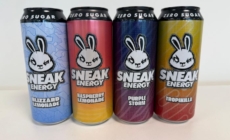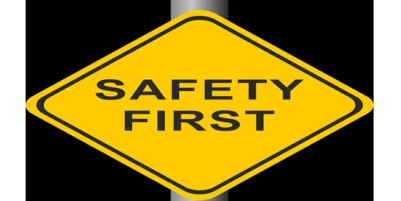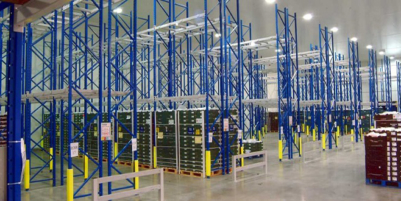-
TMS LAUNCHES INDUSTRY-FIRST HYBRID DVS SOLUTION FOR OPTIMUM DRIVER VISIBILITY AND ROAD SAFETY PERFORMANCE - May 1, 2025
-
Prism eLogistics Keeps Sneak Energy’s Fulfilment Flowing - May 1, 2025
-
EU accessibility act will mean big changes for UK online businesses, says leading ecommerce web designer - May 1, 2025
-
QUECLINK LAUNCHES COMPACT DMS CAMERA SOLUTION FOR ADVANCED DRIVER MONITORING - April 30, 2025
-
CTRACK AND ARTURA JOIN FORCES TO LAUNCH TELEMATICS-ENABLED ACCIDENT AND REPAIR SOLUTION - April 28, 2025
-
GOPLASTICPALLETS.COM CELEBRATES MONUMENTAL 2,000 TONNE RECYCLING MILESTONE - April 24, 2025
-
LSA INTERNATIONAL CHOOSES PROLOG FULFILMENT TO MANAGE ITS DISTRIBUTION & LOGISTICS - April 23, 2025
-
Uniserve Partners with Logistics Reply to Deliver Transformation to Customers Supply Chains - April 23, 2025
-
Nutrivend selects Forterro’s Orderwise to support online expansion and streamline operations - April 11, 2025
-
ARROWXL LAUNCHES AMBITIOUS ZERO WASTE ROADMAP - April 8, 2025
It is not uncommon for a small brand or niche product to become a national or global sensation almost overnight, but to capitalise on these, perhaps unrepeatable, opportunities, firms need more sophisticated processes and systems than they may realise writes Sara Duff, UK Business Development Manager at MRPeasy.com.

A competent MRP/ERP system provides a solid foundation for Health and Beauty sector manufacturers and suppliers. Many of these companies will employ often rare and costly ingredients through complex supply networks, with a high rate of new product development, significant demand fluctuations, and will be subject to varying regulatory regimes across international markets. Manufacturers and brand owners in the health and beauty sector therefore depend on agile, accurate and accountable control systems.
The UK is Europe’s third-largest market for health and beauty products, but it is also a significant manufacturing base. In cosmetics and fragrances alone, nearly 700 manufacturing companies turn over £4 billion. These include brand owners and private label manufacturers in addition to specialist producers of anything from botanical extracts to complex chemical stabilisers, contract manufacturers of finished and intermediate products, and contract fillers/packers. Add in soaps, shampoos, deodorants, toothpastes and other staples and manufacturing turnover is closer to £10 billion.
By turnover, the sector is dominated by the major multinationals but there are many smaller players: since individual products themselves do not have to be approved, barriers to entry are low and many firms have started literally on a kitchen table. It is not uncommon for a small brand or niche product to become a national or global sensation almost overnight, but to capitalise on these, perhaps unrepeatable, opportunities, firms need more sophisticated processes and systems than they may realise. One of our US-based clients, Alcone, saw its new LimeLife brand reach $100 million turnover in four years – as they note, that growth across purchasing, manufacturing, packaging and distribution cannot be managed with spreadsheets.
Although products themselves are not regulated, there are significant compliance duties for companies of all sizes. The UK retains the relevant EU product safety legislation (EU 1223/2019) and there is a requirement to demonstrate Good Manufacturing Practice (GMP), particularly but not solely around cleanliness and contamination. The ‘gold standard’ is ISO 22716 – firms do not have to follow this, but must develop and demonstrate adherence to some code of GMP that achieves the same objectives. In addition, there is a whole range of regulations on permissible ingredients, and requirements for physical, chemical, microbiological and stability testing. It is important to note that many of these requirements extend not just to the product but also to any packaging that it may be in contact with. All of this – and the manufacturing methods employed – has to be maintained on Product Information Files, in addition to test results, etc being associated with individual batch/lot numbers.
Brand owners continually adjust formulations, for both cost and marketing reasons, and just as frequently revert to previous formulations. Manufacturing systems must cope with these subtly different Bills of Material. Our client Skin Actives, a manufacturer of skin and hair care products, notes that MRPeasy allows them to maintain a change log. If a customer wants to revert to a product version as previously supplied, that can be done easily.
Accurate knowledge of the Bill of Materials and the provenance and composition of those materials is also vital in satisfying emerging consumer requirements. Environmental concerns, for example over the use of ‘microbeads’, is one such. There is a growing market for ‘organic’, and indeed ‘vegan’ products, and more generally for ‘cruelty-free’. Animal testing (of products or ingredients) was banned in the EU from 2013, but given the far flung and complex sourcing of some inputs it can be difficult to prove compliance – the more important, therefore, that the relevant proofs are associated with the products and batches in case of challenge.
Product cost is a major consideration, even for high-end items. Some fragrance ingredients, though used in very small quantities, are eye-wateringly expensive – accurate production scheduling to minimise wastage through, for example, clean-downs between batches, is an economic imperative. Yet it is important to be able to track ingredients and products through supply, manufacturing and distribution in small batch sizes to minimise write-offs in the event of product recalls. Tight production control through ERP can also mitigate security issues around small volume high value ingredients.
Demand can be highly seasonal. Fragrances and cosmetics may have sales peaks at Christmas, Valentine’s Day and other festivals across multiple cultures; sun creams in the summer, obviously, but perhaps in a different formulation during the ski-season. Demand variation, across products and especially channels, has also been a factor during the pandemic. Skin Actives tells us: “Like everyone we have been working with reduced staff, but the software enables us to know which sources of material to use for each order, what staffing is needed, and how long and how much it will cost to make a product. This was particularly important at the beginning of the shutdown when we had a major increase in on-line ordering”.
Given the high cost of some inputs, ordering too early or in excess can have a nasty effect on cash flow. With small batch manufacture it can also be difficult to determine the real cost of manufacture. LimeLife reports that the ability to provide the finance department with up to date and accurate projections of all purchase order receipts has been really appreciated for cash flow planning purposes. Skin Actives further note that a competent ERP system like MRPeasy can provide historicals for data analysis to inform demand forecasting and purchasing schedules, and reveal the true levels of labour and other inputs.
Command and control across a web of, often a dozen or more, contract suppliers and manufacturers is difficult – there is much to be said for a cloud-based ERP system that can be readily and inexpensively accessed by members of this constantly changing network.
For smaller manufacturing companies in the health and beauty sector, MRPeasy offers cloud based, affordable (pay-for-use), adaptable and simple to use systems that provide a perfect platform for purchasing, manufacturing, packing and distribution activities. Kelly Argent is ERP Project Manager of Hera Beauty, a private label skincare manufacturer that uses only the finest natural ingredients to produce premium cosmetics products. She reports: “MRPeasy has enabled us to continue to grow our business and allow us to have good control of out stock holding, which we could no longer do with ease using excel spreadsheets. It’s given the production team advantages to clearly see the planning of orders and what stages they are at so we can enhance our customer services. Overall, the implementation whilst is still on-going has added many benefits to our production organisation.” This kind of MRP/ERP system is readily scaleable as a company grows, and making it easy to develop and share vital plans and information both within a firm and across a wider network. Truly, a thing of beauty.

































